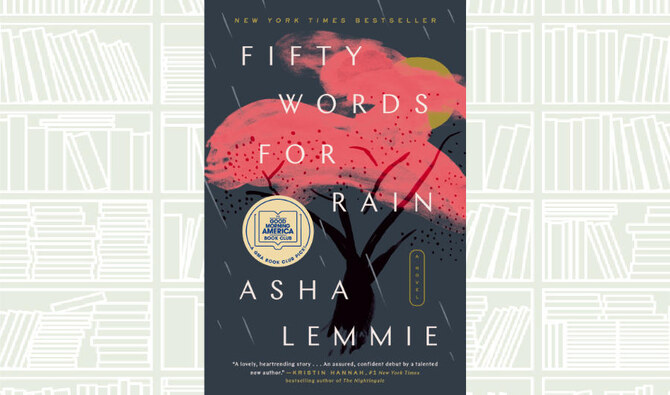Published in 2020, “Fifty Words for Rain” by Asha Lemmie is an invitation to explore identity, belonging, and the complexity of family dynamics in 1940s Japan.
The story takes the reader to Kyoto in Japan almost 100 years ago, following the Second World War, where Nori, a biracial girl born to a Japanese mother and an American father, struggles to find her place in a society that avoids her existence.
When Nori meets her half-brother, Akira, she forms a strong bond with him and makes him an ally despite her grandparents’ opposition to their friendship as they believe it irrevocably changes the lives they were always meant to lead.
One of the story’s strong points is its exploration of the intersection of race and gender, with Nori embodying the struggles faced by those on the margins of society.
Her journey is filled with challenges, including abuse and social rejection, yet it also shows her resilience as she hopes for a brighter future.
The author highlights the impact of the Second World War on the lives of the Japanese, creating a narrative that, while strongly rooted in a specific place and time, is universally relatable.
The story has received backlash from Japanese audiences as some consider it disrespectful to Japanese culture and history, especially where it describes Japan during the 1940s.
Overall, “Fifty Words for Rain” invites readers to reflect on themes of family relations, loss, and identity and serves as a powerful reminder of the enduring strength of the human spirit.
What We Are Reading Today: ‘Fifty Words for Rain’
https://arab.news/rx8tz
What We Are Reading Today: ‘Fifty Words for Rain’

What We Are Reading Today: ‘Rare Tongues’ by Lorna Gibb

Languages and cultures are becoming increasingly homogenous, with the resulting loss of a rich linguistic tapestry reflecting unique perspectives and ways of life.
‘Rare Tongues” tells the stories of the world’s rare and vanishing languages, revealing how each is a living testament to human resilience, adaptability, and the perennial quest for identity.
Taking readers on a captivating journey of discovery, Lorna Gibb explores the histories of languages under threat or already extinct as well as those in resurgence, shedding light on their origins, development, and distinctive voices.
What We Are Reading Today: The Teacher in the Machine

- Scholars at Stanford, MIT, and the University of Illinois in the 1960s and 1970s were encouraged by the US government to experiment with computers and AI in education
Author: Anne Trumbore
From AI tutors who ensure individualized instruction but cannot do math to free online courses from elite universities that were supposed to democratize higher education, claims that technological innovations will transform education often fall short.
Yet, as Anne Trumbore shows in “The Teacher in the Machine,” the promises of today’s cutting-edge technologies aren’t new. Scholars at Stanford, MIT, and the University of Illinois in the 1960s and 1970s were encouraged by the US government to experiment with computers and AI in education.
What We Are Reading Today: All the World on a Page

- “All the World on a Page” gathers 34 poems, written between 1907 and 2022, presenting each poem in the original Russian and an English translation, accompanied by an essay that places the poem in its cultural, historical, and biographical contexts
Author: Andrew Kahn and Mark Lipovetsky
The Russian cultural tradition treats poetry as the supreme artistic form, with Alexander Pushkin as its national hero. Modern Russian lyric poets, often on the right side of history but the wrong side of their country’s politics, have engaged intensely with subjectivity, aesthetic movements, ideology (usually subversive), and literature itself.
“All the World on a Page” gathers 34 poems, written between 1907 and 2022, presenting each poem in the original Russian and an English translation, accompanied by an essay that places the poem in its cultural, historical, and biographical contexts.
The poems, both canonical and lesser-known works, extend across a range of moods and scenes: Velimir Khlebnikov’s Futurist revolutionary prophecy, Anna Akhmatova’s lyric cycle about poetic inspiration, Vladimir Nabokov’s Symbolist erotic dreamworld, and Joseph Brodsky’s pastiche of a Chekhovian play set on a country estate.
What We Are Reading Today: ‘What Is Ancient History?’ by Walter Scheidel

It’s easy to think that ancient history is, well, ancient history —obsolete, irrelevant, unjustifiably focused on Greece and Rome, and at risk of extinction.
In “What Is Ancient History?” Walter Scheidel presents a compelling case for a new kind of ancient history — a global history that captures antiquity’s pivotal role as a decisive phase in human development, one that provided the shared foundation of our world and continues to shape our lives today.
For Scheidel, ancient history is when the earliest versions of today’s ways of life were created and spread — from farming, mining, and engineering to housing and transportation, cities and government, writing and belief systems.
Transforming the planet, this process unfolded all over the world, in Eurasia, Africa, and the Americas, often at different times, sometimes haltingly but ultimately unstoppably.
What We Are Reading Today: ‘I Was Working: Poems’ by Ariel Yelen

Seeking to find a song of the self that can survive or even thrive amid the mundane routines of work, Ariel Yelen’s lyrics include wry reflections on the absurdities and abjection of being a poet who is also an office worker and commuter in New York.
In the poems’ dialogues between labor and autonomy, the beeping of a microwave in the staff lounge becomes an opportunity for song, the poet writes from a cubicle as it is being sawed in half, and the speaker of the title poem decides “to quit everything except work.”


















